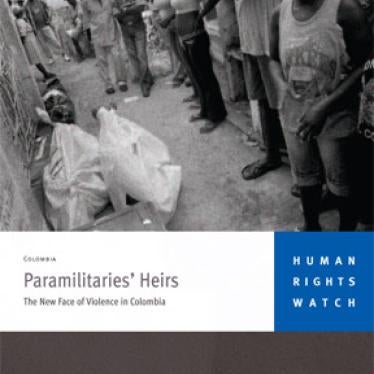(Washington, DC) - The massacre of seven people in southern Colombia, allegedly by Revolutionary Armed Forces of Colombia (Fuerzas Armadas Revolucionarias de Colombia, FARC) guerrillas, underscores the ruthless tactics employed by the country's armed groups, Human Rights Watch said today. The Colombian government should ensure prompt and thorough investigations of these killings, on July 2, 2011, as well as recent killings of members of indigenous communities in northern Colombia, allegedly by successor groups to paramilitaries, Human Rights Watch said.
In the July 2 episode, armed men entered a farm in the San Vicente del Caguán municipality in the southern state of Caquetá and killed six members of a family, including two minors, and an employee. Army and police officials attribute the massacre to the FARC. The FARC has increased its pressure on the civilian population, and maintains an active presence in the area where the killings occurred, according to Colombia's Ombudsman's Office.
"This massacre fits the pattern of cruel abuses committed by the FARC, who routinely target and murder civilians without the slightest respect for the laws of war," said José Miguel Vivanco, Americas director at Human Rights Watch.
In another recent episode, eight people were killed on June 25 in the southern state of Nariño. At least 10 armed men entered a pool hall in the municipality of Colón-Génova and opened fire. The eight people killed included a minor, and four other people were wounded, according to press reports. Successor groups to paramilitaries, the FARC, and the National Liberation Army (Ejército de Liberación Nacional, ELN) guerrilla group operate in the area, a local official told Human Rights Watch.
Seventeen such massacres, resulting in 76 deaths, were reported between January and May, a 21 percent increase over the same period last year, according to official statistics. The government defines a massacre as the killing of four or more people at the same time. Successor groups to paramilitaries contributed to a 34 percent increase in massacres in 2010, the highest annual total since 2005.
Human Rights Watch also called on the Colombian government to ensure prompt and thorough investigations into a recent wave of killings of leaders and members of indigenous communities in the northern states of Antioquia and Córdoba.
On July 5, armed men shot and killed a Zenú indigenous leader, Mérida del Carmen Fuentes Hernández, in the Montelíbano municipality of Córdoba, according to news reports and a local official who spoke to Human Rights Watch. News reports said authorities arrested one of the suspected gunmen, who allegedly belongs to the "Urabeños," a successor group to paramilitaries that emerged out of the flawed demobilization process for members of the United Self-Defense Forces of Colombia (Autodefensas Unidas de Colombia, AUC). A member of the Embera Katío indigenous group had been killed on July 1 in the Montelíbano municipality, news reports said.
On July 2, unidentified assailants shot and killed Fernando Tequía, the governor of an Embera Katío indigenous community in the Urrao municipality in Antioquia. Tequía had denounced illegal mining activities on his land, the Indigenous Organization of Antioquia (Organización Indígena de Antioquia, OIA) said.
Five members of Zenú indigenous communities in northern Antioquia were killed on June 24, 25, and 26, allegedly by a successor group to paramilitaries, the Colombian Ombudsman's Office reported. The alleged victims included Jorge Mejía Estrada, the vice-governor of a Zenú community, and his two sons, both minors, who have been missing since June 25 and are presumed dead.
The Ombudsman's Office said the killers were allegedly members of a paramilitary successor group called the "Rastrojos." At least three other successor groups also operate in the region, including the "Urabeños," "Black Eagles," and "Paisas," according to the Ombudsman's Office.
A total of 14 members of indigenous communities have been killed so far in 2011 in Antioquia, dozens of indigenous families have been displaced, and numerous leaders have been threatened, the OIA told Human Rights Watch.
"Indigenous communities suffer extreme violence at the hands of Colombia's powerful armed groups, including successor groups to paramilitaries," Vivanco said. "Colombian authorities need to take urgent measures to protect indigenous communities from the brutal armed groups that frequently murder, threaten, and forcibly displace them."







